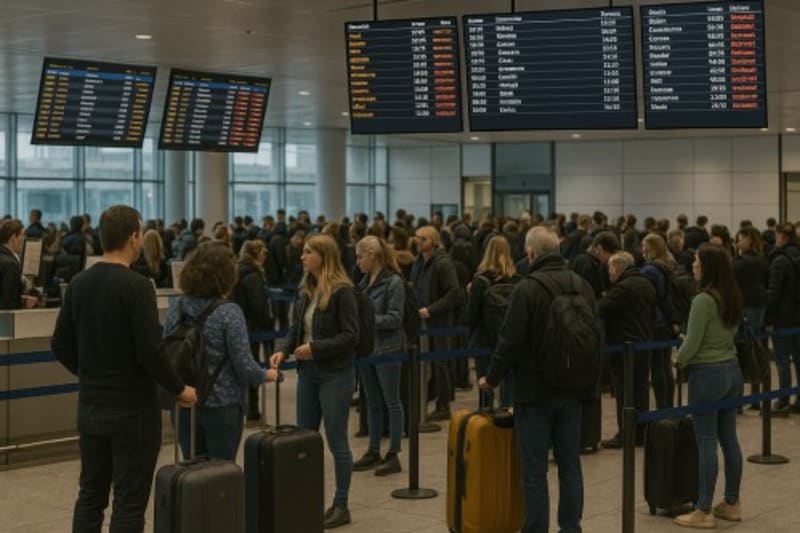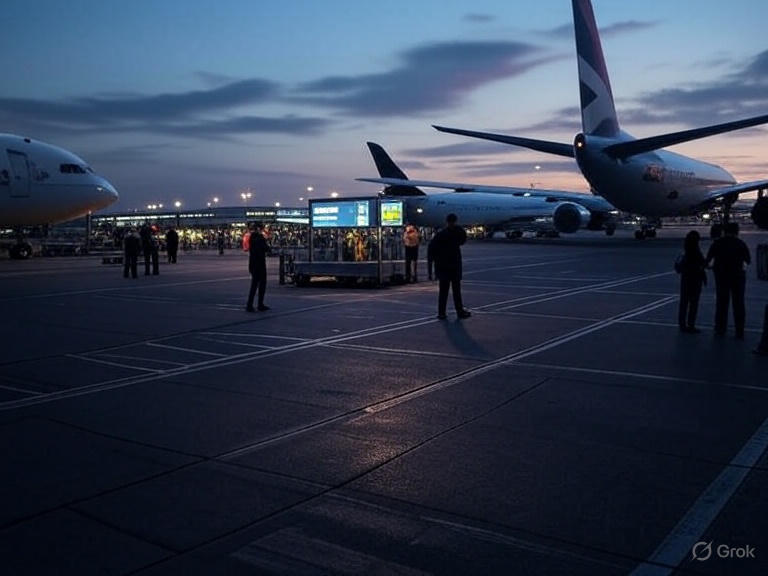London / Brussels / Berlin, September 20, 2025– A widespread cyberattack targeting aviation software from Collins Aerospace forced several major European airports to abandon automated check-in and baggage systems, resulting in flight delays, cancellations, and long queues for travelling passengers.
What Happened: Context & Background
The incident reportedly began late Friday night, when Collins Aerospace discovered a “cyber-related disruption” affecting its MUSE (Multi-User System Environment) software used for electronic check-in, boarding, and baggage drop at selected airports. AP News+2Financial Times+2

The affected airports include London Heathrow, Brussels Airport, and Berlin Brandenburg. AP News+2Financial Times+2
As a result, airports have reverted to manual check-in and baggage drop procedures. That has exacerbated wait times and led to significant delays. In Brussels, about ten flights were cancelled and many others delayed by roughly an hour or more. AP News+2Financial Times+2
Alleged vs. Confirmed Information
Confirmed:
The provider, Collins Aerospace, has acknowledged a “cyber-related disruption” and said the issue is limited to electronic check-in and baggage drop, which can be mitigated with manual operations. AP News+2Financial Times+2
Heathrow has confirmed disruptions; Brussels has reported flight cancellations and delays; Berlin sees longer wait times. AP News+1
Alleged / Unclear:
It is not yet known who is behind the attack, whether it was intentional sabotage, a targeted hack, or a fault that got classified as cyber-related. No claims of responsibility have been made public at this time.
The full scope of affected airports beyond the three named is unconfirmed. Some airports have said they are unaffected. Reuters+2AP News+2
Direct Quotes
“There was a cyber-attack on Friday night … against the service provider for the check-in and boarding systems affecting several European airports including Brussels Airport.” — Brussels Airport, on site statement. AP News+1
“We have become aware of a cyber-related disruption to our MUSE software in select airports. We are actively working to resolve the issue and restore full functionality to our customers as quickly as possible.” — RTX (parent company of Collins Aerospace) statement. Financial Times+2AP News+2
“The impact is limited to electronic customer check-in and baggage drop and can be mitigated with manual check-in operations.” — RTX, on how the incident is being handled. AP News+1
Effects & Response
Airports advise travellers to check with their airlines for updates before heading to terminals. Brussels has asked people to only travel to the airport if their flight is confirmed. AP News+1
Heathrow says the impact at its hub has been “minimal” in terms of cancellations, though delays are expected. AP News+1
Efforts are underway to bring systems back online and reduce disruption by using backup/manual procedures. Airline operators are working closely with airport authorities and the software provider. AP News+1
Conclusion & What Comes Next
In the coming hours and days:
Technical resolution is expected: Collins Aerospace/RTX is working to restore automated systems. Airlines and airports are preparing for full recovery.
Regulatory scrutiny may follow: Given the growing concern about cybersecurity in critical infrastructure, investigations may be opened into how such vulnerabilities were allowed, whether oversight was sufficient, and what safeguards were in place.
Passenger welfare and compensation: Affected travellers may seek refunds, rebooking, or compensation for cancelled/delayed flights, depending on airline and national regulations.
Broader lessons are likely to include stronger backup systems, redundancy, more frequent cybersecurity audits, and clearer contingency plans at airports and system providers.








Comments
No comments yet. Be the first to comment!